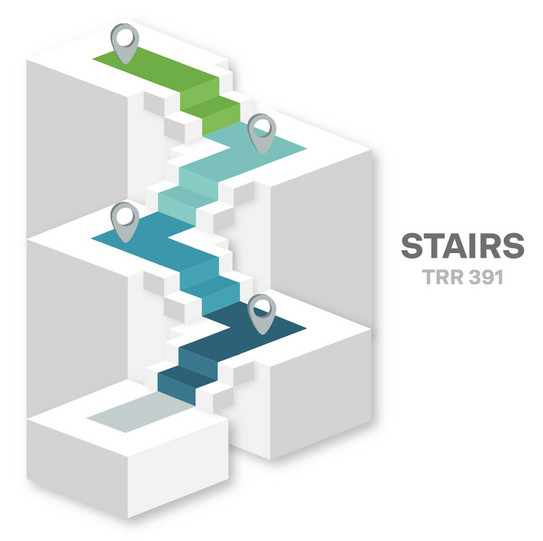Integrated Research Training Group (STAIRS)
The research projects in TRR 391 are supported by the integrated research training group of project MGK, the Spatio-Temporal Analysis Interdisciplinary Research School (STAIRS).
STAIRS is dedicated to the qualification of the next generations of researchers. It gives doctoral and postdoctoral researchers the opportunity to conduct interdisciplinary research directly from the beginning of their career. The program provides excellent training that enables participants to become leading experts in their specific field of research and to actively engage in an interdisciplinary academic network.

Project Leaders
Prof. Dr. Carsten Jentsch
Department of Statistics - Chair of Business and Social Statistics
TU Dortmund University
JProf. Dr. Kirsten Schorning
Department of Statistics - Chair of Mathematical Statistics
TU Dortmund University
Contact
Dr. Mirko Alexander Jakubzik
STAIRS Manager of TRR 391
Department of Statistics - Chair of Statistics with Applications in Engineering Sciences
TU Dortmund University
About STAIRS
The Transregio TRR 391 considers a wide range of highly relevant prototype statistical applications from the areas of energy and transport. It pursues a joint methodological perspective to lift the specific application-driven problems on a higher methodological level, to identify similarities and to use these synergies for the development of novel fundamental statistical methodology for spatio-temporal data analysis.
For such an interdisciplinary approach to be successful, TRR 391 requires specialists in modeling spatio-temporal data paired with specific domain knowledge from the different application fields. To achieve this, doctoral researchers need a sufficiently broad training to be able to collaborate successfully with the researchers from different disciplines. The Spatio-Temporal Analysis Interdisciplinary Research School (STAIRS) of TRR 391 will provide an excellent training to outstanding doctoral and postdoctoral researchers to become leading experts in their specific field of research, and active participants in an interdisciplinary research network. Moreover, they will be trained in various transferable skills for a successful career inside and outside academia.
These goals will be achieved by a TRR-specific training program installed in the framework of STAIRS. While this program will contain a general scientific training on advanced and domain specific methodology for the analysis of spatio-temporal data, STAIRS will also ensure the training of relevant transferable skills. Furthermore, the doctoral researchers will attain competences important for conducting interdisciplinary research by participating in (and co-organizing) seminars and retreats. These opportunities for interdisciplinary exchange are complemented by their active participation in scientific TRR-wide events. Finally, STAIRS provides a tailored supervision concept to accompany participants throughout the program.
In this way, STAIRS will guide and train a future generation of highly qualified scientists who are well prepared for addressing the challenges of spatio-temporal data analysis in the next decades.



